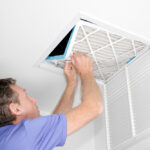In this particularly warm Utah summer, many homeowners are dealing with especially hot homes. And while the HVAC system in your home will take on much of the job of cooling it during the hottest parts of the summer, there are ways you can improve its efficiency while also limiting the monthly bills it creates on your behalf.
At Action Plumbing, Heating, Air & Electric, we’re happy to offer a wide variety of services to help keep you cool and comfortable throughout the summer, from air conditioner installation to many areas of repair, thermostat upgrades and more. If your home is getting too hot for certain periods during summer days, what are some of the top areas — both HVAC and otherwise — that you should be checking into to help lower the strain on your AC unit? Here are several to consider, both on your own and with the assistance of our HVAC pros.
Check Your Air Filter
Most of us are more than familiar with the basic concept behind air filters, both at home and at work. We usually have to replace them either monthly or every few months as part of our maintenance schedule. If they aren’t, though, issues may arise, including temperature imbalances.
If you are experiencing any type of problems (such as low air flow, back-up or pressure on the blower, gusts of heat coming from certain vents and so forth), these are possible signs that your filter needs to be changed. A clogged filter simply won’t allow for the same level of airflow as a clean filter, which in turn will cause the system to have to work much harder to create the same level of cooling — and there may even be situations where, due to the extreme heat outside, a clogged filter doesn’t allow the desired temperature to be reached at all.
Clean AC Unit Coils and Fans
Over time, dust and other small airborne particles can accumulate within the coils of your air conditioner, ventilating fans or both. This will naturally reduce their efficiency at cooling the air around them — as grime builds up between the fins or panels, there are fewer places for cold air to travel through, so more energy needs to be used.
To help your AC get the air circulating as quickly and effectively as possible, clean out the coils and fans on a regular basis. Simply use a can of spray that is safe for metal and electronics (such as a window cleaner or compressed-air duster), spraying it into the fins or vents above to clear them of any debris. Once you’ve done that, you’ll want to turn on the unit for about five minutes so that it can dry out any moisture that may have been left behind.
Turn Off Lights and Utilize Fans in Rooms
One of the most common mistakes made by homeowners in an effort to keep their homes cool is leaving every light on in every room. While this may keep your home lit up, it will actually only serve to make your air conditioner work harder — during summer months especially, a well-lit home requires much more energy and power to cool than a dimly lit one. By simply turning off as many lights as possible — or, at the very least, using light-spectrum bulbs that create less heat — you can lower your AC’s workload and save on your monthly bills.
In addition to this, it is also important to utilize fans in key areas of your home during hot summer months. By either using ceiling fans in the rooms that you use most often or by installing wall-mounted versions in your kitchen and bathrooms, you will be able to circulate a cool breeze throughout your entire home.
Close Windows and Curtains During the Day
If you are a homeowner who likes to keep the windows open for fresh air during the day, this may be more of an issue than you realize. While it is important to keep your home well-ventilated — especially during summer months when moisture can build up so quickly — it will also cause your AC unit to work harder than necessary. Not only should windows themselves be closed during the heat of the day, curtains should be used to keep hot sun rays from warming up your home.
Consider Insulation Upgrades
If you are a homeowner who has noticed that your home is becoming hotter during the day, and then colder during the night or early morning hours, there may be an issue with the insulation in your attic. To improve circulation of air throughout your home, consider adding additional insulation panels to help cover up any heating/cooling ducts, air vents or other openings which may be allowing hot/cold air to escape.
In other cases, insulation might not be required for HVAC components themselves, but rather for surrounding areas of the home. For instance, if your attic extends over your home’s garage, the heat from the attic will often transfer into the garage — and this process will be sped up significantly if proper levels of insulation are not present between these two areas. And during the winter, this issue will flip around as cold air seeps into the garage or even interior areas of your home. But with a simple increase in insulation, you’ll avoid these issues.
For more on what to do if your home is simply too hot this summer, or to learn about any of our plumbing or HVAC services, speak to the staff at Action Plumbing, Heating, Air & Electric today.


